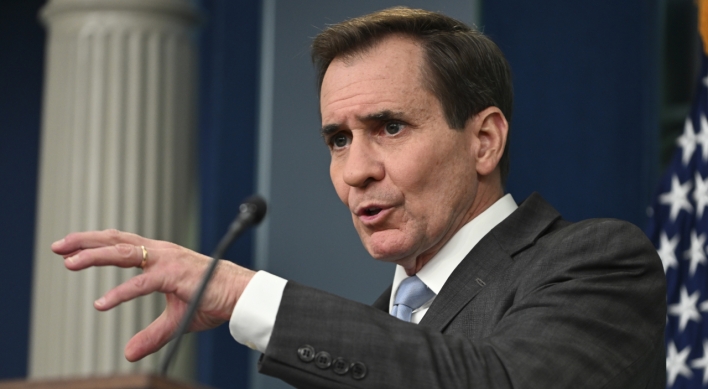Park forges ahead with leadership
Controversial nominees, follow-up talks remain stumbling blocks
By Korea HeraldPublished : March 18, 2013 - 20:18
President Park Geun-hye forged ahead with her state agenda Monday following the parliamentary agreement on her new Cabinet plans, ordering her aides to swiftly assist each ministry to begin work. But major obstacles remain for Park as some of her minister choices are staunchly opposed by the main opposition Democratic United Party, while the rival parties’ vaguely worded agreement leaves much more to be worked out.
“We should be speeding up our work more efficiently with a clear direction and purpose for our state operation, as we are making a delayed start,” Park said in a meeting of senior presidential secretaries.
“We should be speeding up our work more efficiently with a clear direction and purpose for our state operation, as we are making a delayed start,” Park said in a meeting of senior presidential secretaries.

At the meeting, Park emphasized cooperation between and among the ministries and proper communication of the government’s policies to the public.
“For cooperative work, task force or a cooperative body should be formed (between the ministries) … with the budget for the project going to the team instead of the ministry,” presidential spokeswoman Kim Haing quoted Park as saying.
Each ministry, starting with the Industry, Commerce and Resources Ministry this Thursday, will brief Park on their policy and budget plans and ways to cooperate with other government organizations, Cheong Wa Dae spokesman Yoon Chang-jung said.
The ruling Saenuri Party and the DUP endorsed Sunday a set of agreements over the new Cabinet lineup and parliamentary operations, including setting up a special parliamentary committee to discuss broadcasts’ integrity, which was the key sticking point that had dragged on the negotiation. The parties are set to vote on the reorganization bill on Wednesday.
The talks, however, did not include the matter of defense minister-nominee Kim Byung-kwan and finance minister-designate Hyun Oh-seok, both of whose confirmations have not been approved by the Assembly. The opposition questions Kim over a slew of allegations over his ethicality, and the competency of Hyun as the economic control tower.
But sources said Park appeared to remain adamant in her choices who, if instated, would each take charge of the nation’s security and economy at a time of threats on both fronts.
The DUP indicated it would remain equally tough.
“When confirmation hearing reports (of certain candidates) are not passed at the Assembly, it sends a clear message that there are differences between the rival parties. It is hoped that President Park quickly withdraws her nominations of Kim and Hyun,” said DUP interim leader Moon Hee-sang.
The party’s floor leader Park Ki-choon also placed fair trade commissioner-designate Han Man-soo on his radar, denouncing him as unfit to promote “economic democratization” for being pro-chaebol. Han’s hearing is scheduled for March 28.
The seat for the chief of the Board of Audit and Inspection remains hanging in the air as well. While incumbent chairman Yang Kun has two more years left of his tenure, reports said Cheong Wa Dae was possibly considering replacing him to make a “fresh start.”
More complications loom ahead for the controversy-ridden Ministry of Future Planning and Science, which is to finally launch after taking center stage in the political wrangling of the past six weeks.
The two parties agreed on transferring many of the policy promotion aspects of broadcasting and communications to the new ministry, which is an amalgamation of officials from the previous government’s Korea Communications Commission, Education and Science Ministry, Public Administration and Safety Ministry and Knowledge Economy Ministry.
The ministry, which will spearhead Park’s vision for innovative economy, is expected to inevitably suffer internal power struggle, some observers said.
Prospects are equally questionable over the parties’ agreement to run a special committee on broadcasting companies’ neutrality and fairness for six months, an agreement made in exchange for mostly maintaining Park’s original plan for the science ministry.
The committee is to be comprised of nine Saenuri Party and nine DUP lawmakers to prepare such measures as guaranteeing autonomy in reporting, producing and scheduling of programs and securing fair market shares for cable channels.
The two parties are expected to lock horns most imminently over how to improve the ownership system of public broadcasters. The DUP has suggested requiring two-thirds of attending KCC members’ approval in nominating the board of directors for public broadcasting companies, which the Saenuri Party rejects.
By Lee Joo-hee (jhl@heraldcorp.com)
-
Articles by Korea Herald





![[Music in drama] Rekindle a love that slipped through your fingers](http://res.heraldm.com/phpwas/restmb_idxmake.php?idx=644&simg=/content/image/2024/05/01/20240501050484_0.jpg&u=20240501151646)




![[New faces of Assembly] Architect behind ‘audacious initiative’ believes in denuclearized North Korea](http://res.heraldm.com/phpwas/restmb_idxmake.php?idx=644&simg=/content/image/2024/05/01/20240501050627_0.jpg&u=20240502093000)








![[Today’s K-pop] Stray Kids go gold in US with ‘Maniac’](http://res.heraldm.com/phpwas/restmb_idxmake.php?idx=642&simg=/content/image/2024/05/02/20240502050771_0.jpg&u=)